Offer details
Internship Study of the quantum and stochastical noises influence on quantum algorithm convergence F/H (2024-122968)
Posted on 10/12/2024
- Contract type:
- Internship
- Level of education:
- Master, DEA, DESS
- Specializations:
- Ingineering/R&D/Expertise
- Country / Region:
- France / Ile-de-France
- Department:
- Essonne (91)
- City:
- Palaiseau

Description of the offer
As computational demands for analyzing large infrastructures continue to grow, innovative methods are needed to overcome current limitations in simulation technologies. The Finite Element Method (FEM) is extensively used in industry to meet the safety and stability demands of large-scale infrastructures. With the onset of the "quantum revolution" and the anticipated emergence of highly efficient quantum algorithms, longstanding challenges such as scalability and mesh dependency could be approached in a radically new way. This may pave the way for significant advancements in handling complex simulations.
At the ERMES department of EDF R&D, we initiated work on a variational quantum algorithm (VQA) for partial differential equations (PDE) in late 2021, initially transposing the classical mechanical problem of fracture. Consider an elastic object, like concrete, and discretize it with the finite elements method. If we somehow squeeze it via a force f, a crack appears. We get a PDE, that we reformulate as a minimisation problem.
Quantumly speaking, we search for a state Ψ in which an observable K corresponds to the elastic energy E minimum. To generate Ψ, we use a parametrized ansatz. We measure K in each generated state Ψ. We minimise K with regard to the ansatz parameters to get Ψopt, close to the real Ψ.
The main sources of error are :
the ansatz-reachable space is not equal to the total space,
the sampling yields an approximation of the value of E,
and the noisy measurements introduces errors too.
Moreover, it is unclear what are the most efficient classical algorithms for this problem.
During this internship we will focus on the noise influence on convergence of quantumly reformulated various FEM problems. Our intention is to investigate complex geometries, thermo-mechanical coupled problems or 3D extensions of the aforementioned problems. We will study not only the method of computation, but also the numerical efficiency and proof scaling with system size. In doing so, we could benchmark several state of the art quantum hardware technologies, thanks to our partnerships with Quandela, Pasqal, Alice&Bob and more.
The student could also work on the more long-term goal of quantum reformulation of other original non-linear PDEs. The internship will be conducted under joint supervision of a research engineer and a PhD student from ERMES (mechanics) EDF R&D department and LERMA laboratory.
[1] Sato, Y. et al. (2021). Variational quantum algorithm based on the minimum potential energy for solving the Poisson equation. Physical Review A, 104(5), 052409. [arxiv/2106.09333]
ONLY applications sent straight to kyrylo.kazymyrenko@edf.fr with subject keyword « stage_quantum », will be considered
Desired profile
Master in Quantum Computing, Applied Mathematics, or Mechanics.
Knowledge of Python, Quantum Computing, or Finite Elements
These offers might interest you:
-
-
Permanent contract
-
United Kingdom
-
,
-
Ingineering/R&D/Expertise
-
-
-
Permanent contract
-
France
-
,
-
Ingineering/R&D/Expertise
-
-
-
Permanent contract
-
United Kingdom
-
,
-
Ingineering/R&D/Expertise
-




